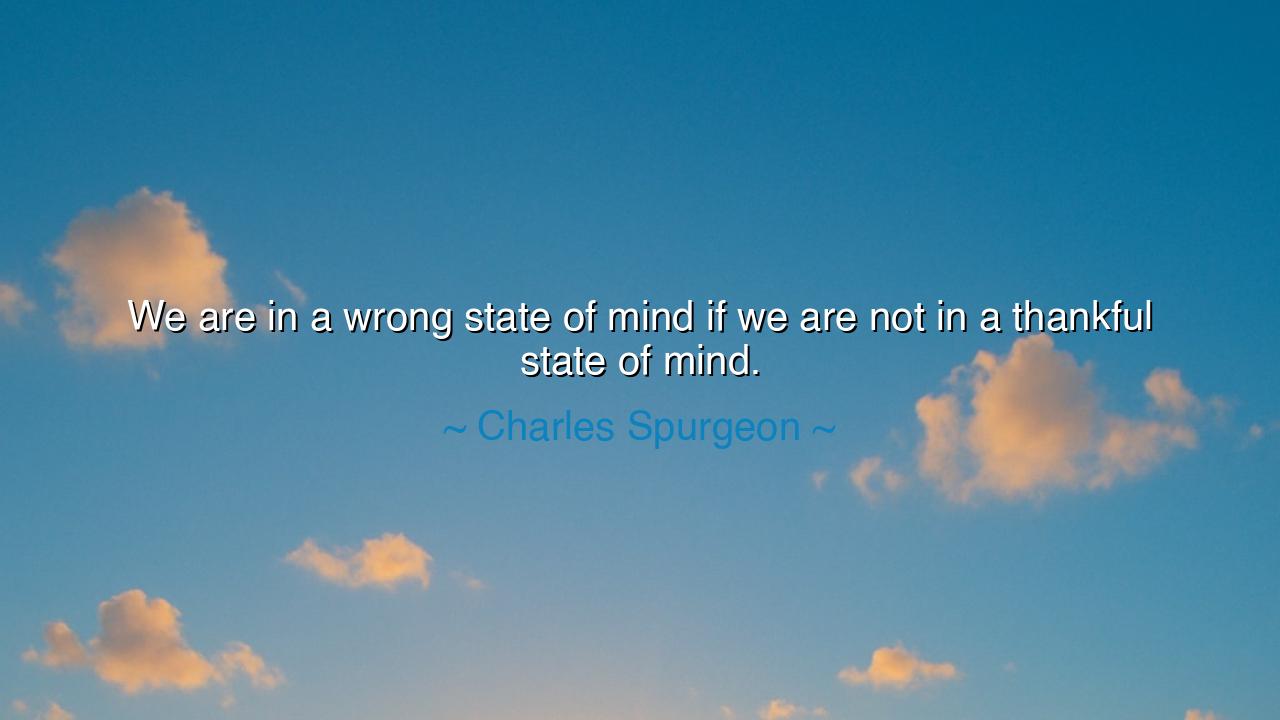
We are in a wrong state of mind if we are not in a thankful






Hear the words of Charles Spurgeon, the preacher whose voice once shook the hearts of thousands: “We are in a wrong state of mind if we are not in a thankful state of mind.” In this brief but mighty saying, he lays bare a truth deeper than wealth, deeper than power, deeper even than learning—that the health of the soul is measured not by knowledge or possessions, but by thankfulness. Gratitude, he teaches, is not optional but essential; without it, the mind is distorted, the heart is crooked, and the spirit is unwell.
The first jewel in this teaching is the link between thankfulness and clarity of mind. Spurgeon proclaims that when gratitude departs, the mind itself falls into error. For without gratitude, envy takes root, bitterness blooms, and dissatisfaction clouds the eyes. A man without thankfulness looks only at what is absent, and so his judgment is warped. But the thankful soul sees blessings even in trial, and thus perceives the world more truly. Gratitude is not a decoration upon life; it is the very balance that keeps the mind steady.
The second flame is the recognition of wrongness. Spurgeon does not say that ingratitude is a small flaw; he calls it a wrong state of mind. That is, it is not merely a mistake but a sickness, a corruption of the heart’s posture. Just as a compass that does not point north misguides the traveler, so too does a mind without gratitude mislead the soul. To be unthankful is to be lost, wandering without light, unable to recognize the gifts already in one’s grasp.
The third truth is the power of thankfulness to transform suffering. Spurgeon himself preached through many seasons of trial and depression, yet he insisted that even then, one must fight for gratitude. Why? Because thankfulness does not deny hardship, but reorients the heart to see beyond it. It whispers, “Even in sorrow, there is mercy. Even in loss, there is love. Even in darkness, there is a star that shines.” The mind that clings to gratitude remains in a right state, while the unthankful mind sinks into despair.
History gives us a mirror in the story of Corrie ten Boom, the woman who, during the horrors of the Nazi camps, chose to give thanks even for the fleas that infested her barracks. She later discovered that the guards avoided entering those flea-ridden quarters, allowing her and others to worship freely. What seemed like torment became a blessing, revealed only through thankfulness. Her story confirms Spurgeon’s wisdom: the thankful state of mind perceives truth that ingratitude blinds us to.
The lesson is profound: the soul must be trained in thankfulness, lest it fall into ruin. Just as the body requires breath, so the spirit requires gratitude. Without it, envy corrodes, pride blinds, and despair consumes. With it, peace flourishes, joy grows, and wisdom deepens. Gratitude is not the ornament of a good life—it is its foundation.
Practically, this means we must cultivate gratitude daily. Begin each morning not with complaint but with thanksgiving, naming aloud the blessings you hold. End each night with reflection upon what was given, even in hardship. When trials come, pause and ask: What can I yet be thankful for here? In practicing this discipline, the mind is kept in a right state, as Spurgeon commands, and the heart is preserved from corruption.
Thus his words resound like a trumpet across the ages: “We are in a wrong state of mind if we are not in a thankful state of mind.” To live in gratitude is to live rightly; to forsake it is to lose balance and truth. Therefore, let thankfulness be your compass, your shield, your daily bread, for in it lies the health of the soul and the path of wisdom.






AAdministratorAdministrator
Welcome, honored guests. Please leave a comment, we will respond soon